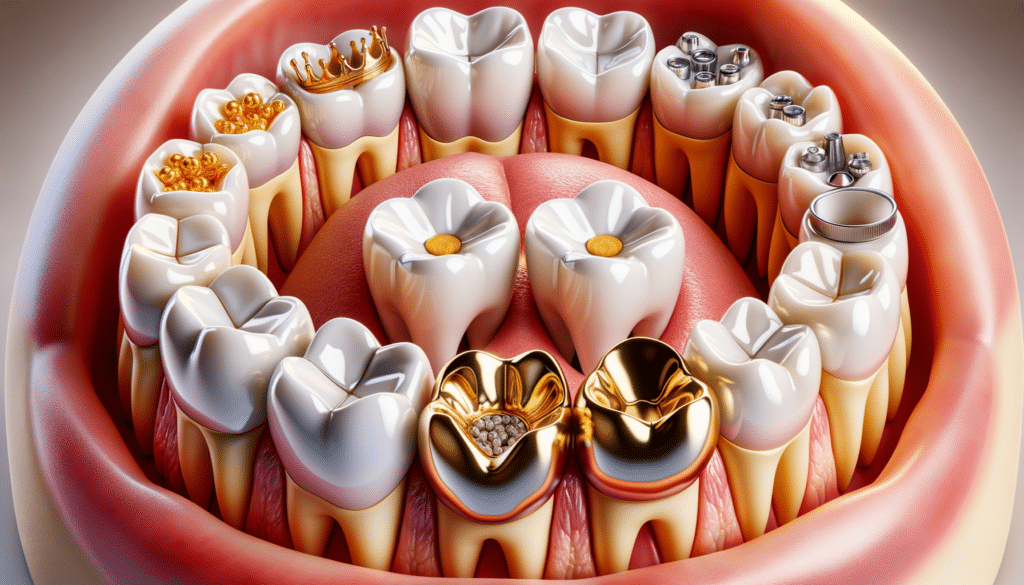What Are Dental Crowns?
Dental crowns are prosthetic devices used in dentistry to restore the shape, size, and function of a damaged tooth. Unlike fillings, which cover only a portion of a tooth, crowns encase the entire visible part of the tooth. They are often recommended when a tooth is severely decayed, cracked, or otherwise compromised. Crowns can be made from a variety of materials, including metals, porcelain, resin, and ceramics, each offering different benefits and aesthetic results.
When a tooth is damaged, it can affect not only your smile but also your overall oral health. Dental crowns provide a robust solution by protecting the underlying tooth structure from further damage. They also help restore the tooth’s function, allowing you to chew and speak properly. Moreover, crowns can improve the appearance of your teeth, contributing to a more confident smile.
Key facts about dental crowns:
- Durability: Crowns can last between 5 to 15 years, depending on the material and care.
- Versatility: They are used for various dental issues, from cosmetic enhancements to structural repairs.
- Customization: Crowns are custom-made to match the color and shape of your natural teeth.
Types of Dental Crowns
Dental crowns come in several types, each with unique properties that make them suitable for different situations. The choice of crown depends on factors such as the location of the tooth, the amount of natural tooth remaining, and the patient’s aesthetic preferences.
Metal Crowns: These are made from alloys containing a high content of gold or platinum, or base-metal alloys. Metal crowns are known for their strength and durability, making them ideal for molars that endure significant pressure from chewing.
Porcelain-Fused-to-Metal (PFM) Crowns: These crowns offer a balance between strength and aesthetics. The metal structure provides durability, while the porcelain overlay mimics the appearance of natural teeth. They are a popular choice for both front and back teeth.
All-Ceramic or All-Porcelain Crowns: Offering the best color match to natural teeth, these crowns are an excellent choice for front teeth. They are less durable than metal crowns but provide superior aesthetics.
Resin Crowns: Made from composite resin, these crowns are less expensive but also less durable. They are often used for temporary purposes.
The Dental Crown Procedure
Getting a dental crown typically involves two visits to the dentist. During the first visit, the dentist examines and prepares the tooth, which may involve taking X-rays to check the roots and surrounding bone. If the tooth is severely decayed or if there is a risk of infection, a root canal treatment may be performed first.
The dentist then reshapes the tooth to make space for the crown. This involves removing a layer of the tooth’s outer structure. Once the tooth is prepared, an impression is made of the tooth and the surrounding teeth to ensure the crown fits properly. This impression is sent to a dental laboratory where the crown is custom-made.
A temporary crown is placed over the prepared tooth to protect it until the permanent crown is ready. During the second visit, the temporary crown is removed, and the permanent crown is cemented into place. The dentist checks the fit and makes any necessary adjustments to ensure the crown functions correctly.
Benefits and Considerations of Dental Crowns
Dental crowns offer numerous benefits, making them a popular choice in restorative dentistry. They provide a strong and lasting solution for damaged teeth, restoring both functionality and appearance. Crowns can help prevent further dental issues by protecting the underlying tooth structure.
However, there are considerations to keep in mind. Crowns can sometimes become loose or fall out, particularly if the underlying tooth structure is compromised. Good oral hygiene and regular dental check-ups are essential to maintain the integrity of the crown and the health of the surrounding teeth and gums.
Additionally, some patients may experience sensitivity to hot or cold foods and drinks after getting a crown. This sensitivity usually subsides over time, but if it persists, it is important to consult with a dentist.
Cost and Maintenance of Dental Crowns
The cost of dental crowns varies significantly based on the material used, the complexity of the procedure, and the dentist’s location. Metal crowns tend to be the least expensive, while all-ceramic crowns are generally more costly due to their aesthetic advantages.
Insurance coverage for dental crowns can vary, so it is important to check with your provider. Many dental plans cover a portion of the cost, particularly if the crown is necessary for medical reasons rather than cosmetic purposes.
Maintenance of dental crowns is similar to caring for natural teeth. Regular brushing and flossing, along with routine dental visits, are crucial to ensure the longevity of the crown. Avoiding hard foods and using a mouthguard if you grind your teeth can also help protect the crown from damage.





